Heat Ahead for the Weekend in the South and West
Special Stories
20 Jul 2018 12:43 PM
More than a dozen states are under heat alerts through this weekend and into next week as temperatures soar into the triple digits. The heat index will likely reach above 110 at times in areas under Excessive Heat Warnings, which include Dallas, Phoenix, and Las Vegas.
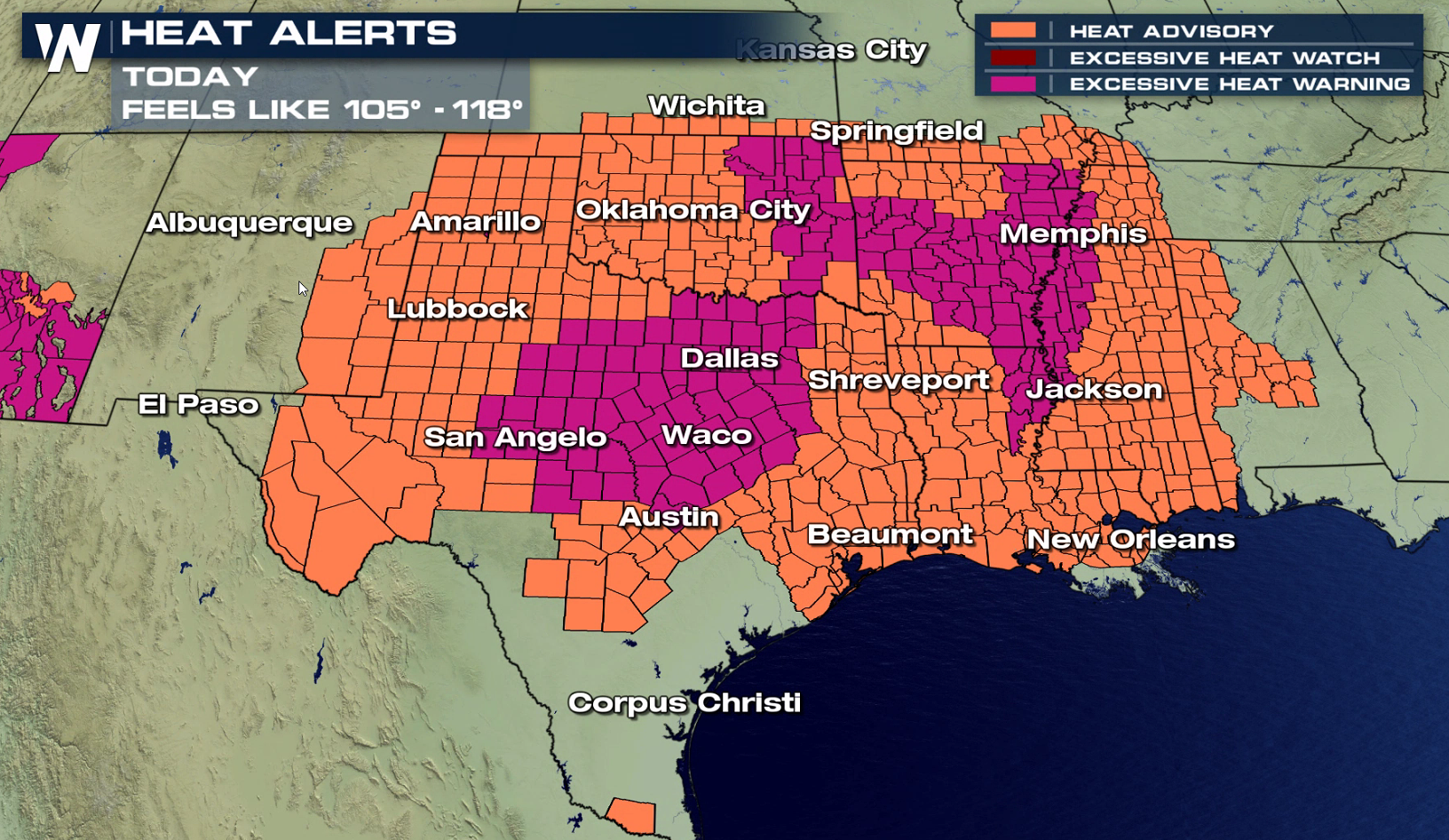
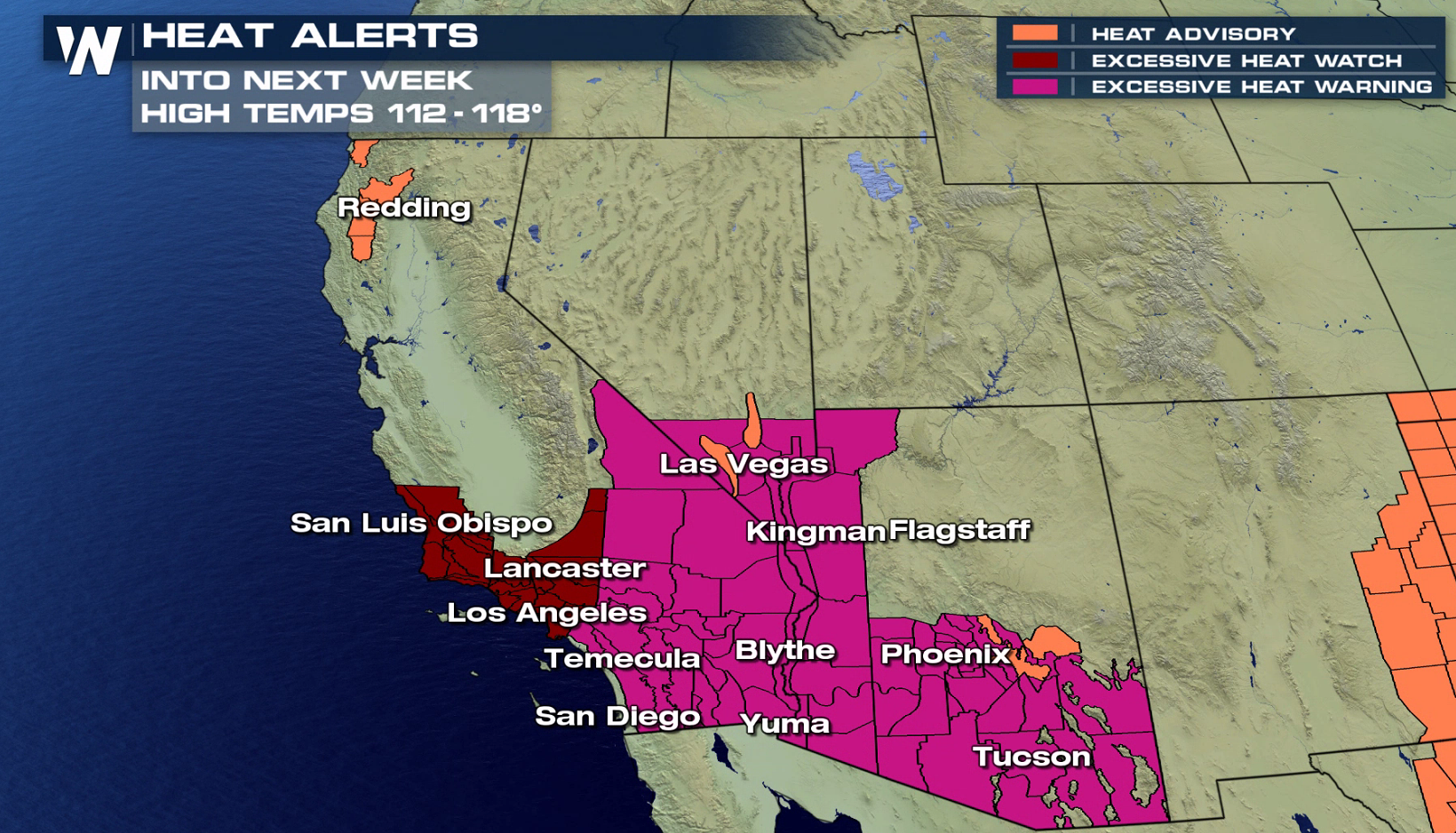 Oklahoma City and Dallas will be near 110 degrees today (Friday), with temperatures running 10 to 15 degrees above average. Several cities will likely see record highs today. Residents are reminded to stay cool, stay hydrated, and stay informed.
Heat related illnesses such as heat exhaustion and heat stroke will be possible. People most vulnerable include those who are spending lots of time outdoors, those who do not have air conditioning, young children, the elderly, and those with chronic ailments.
Oklahoma City and Dallas will be near 110 degrees today (Friday), with temperatures running 10 to 15 degrees above average. Several cities will likely see record highs today. Residents are reminded to stay cool, stay hydrated, and stay informed.
Heat related illnesses such as heat exhaustion and heat stroke will be possible. People most vulnerable include those who are spending lots of time outdoors, those who do not have air conditioning, young children, the elderly, and those with chronic ailments.
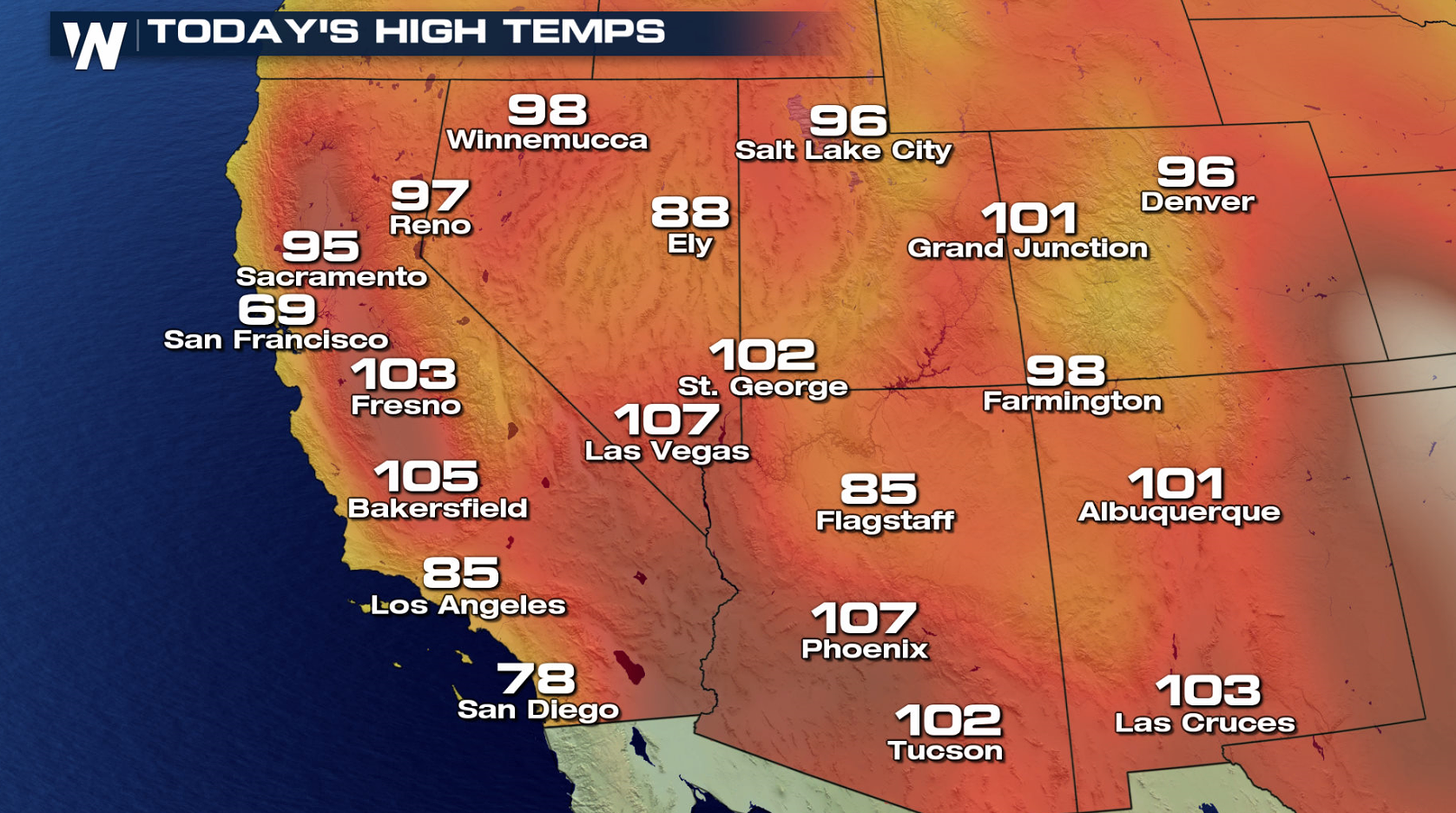
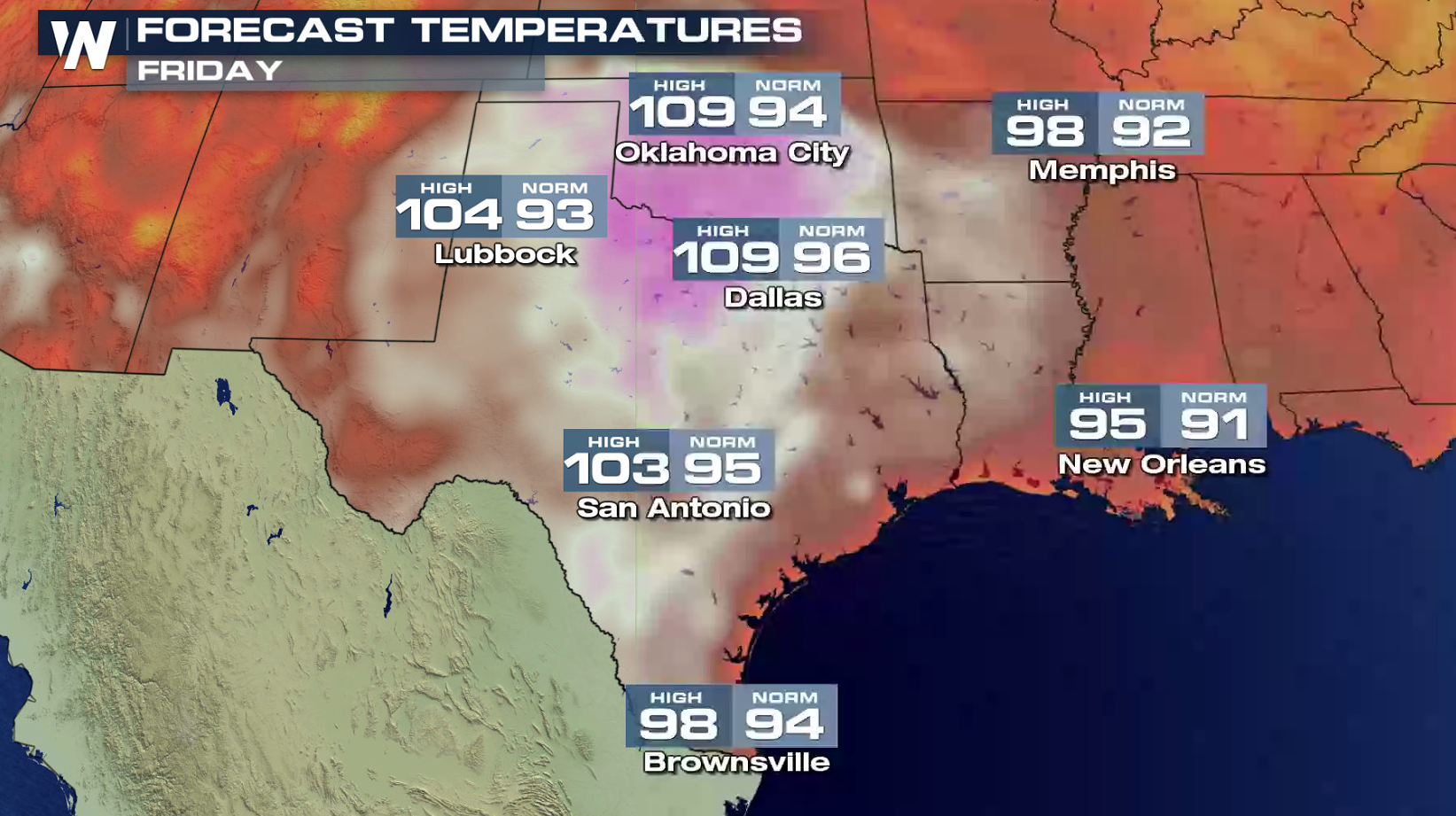
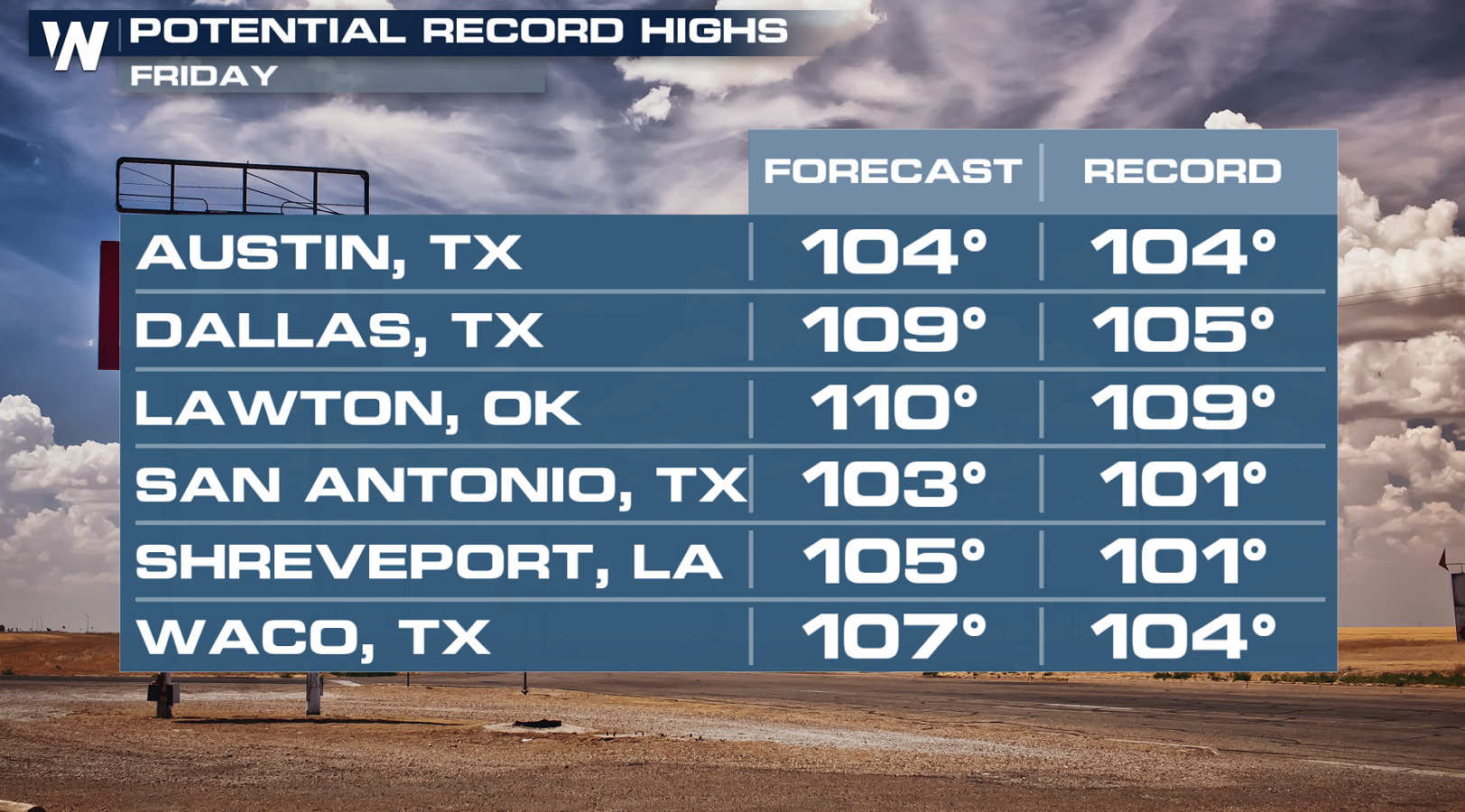 Texas will be as hot on Saturday, but it won't be as oppressive north of the Red River of the South. The heat will start to increase further west, as Las Vegas will approach 110.
Recognize the signs and symptoms of heat illness. Early symptoms include things such as headache, thirst, and muscle cramps. Serious symptoms include weakness, skin that is cool to the touch, fast but weak pulse, nausea, and fainting. Severe symptoms include hot and red dry skin, fast and strong pulse, sweating that has stopped, and unconsciousness. Untreated heat illness can lead to fatal heat stroke.
Texas will be as hot on Saturday, but it won't be as oppressive north of the Red River of the South. The heat will start to increase further west, as Las Vegas will approach 110.
Recognize the signs and symptoms of heat illness. Early symptoms include things such as headache, thirst, and muscle cramps. Serious symptoms include weakness, skin that is cool to the touch, fast but weak pulse, nausea, and fainting. Severe symptoms include hot and red dry skin, fast and strong pulse, sweating that has stopped, and unconsciousness. Untreated heat illness can lead to fatal heat stroke.
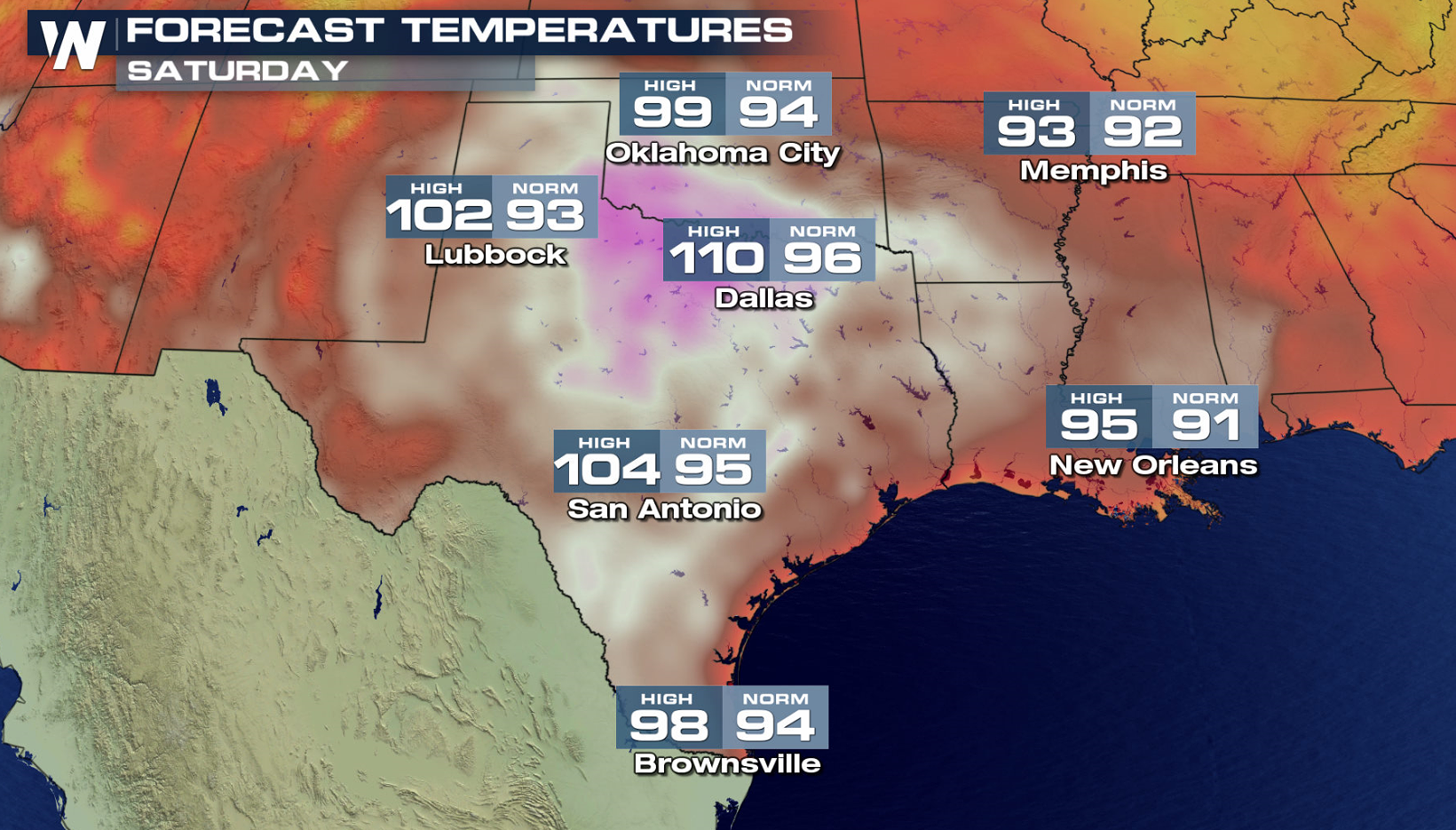
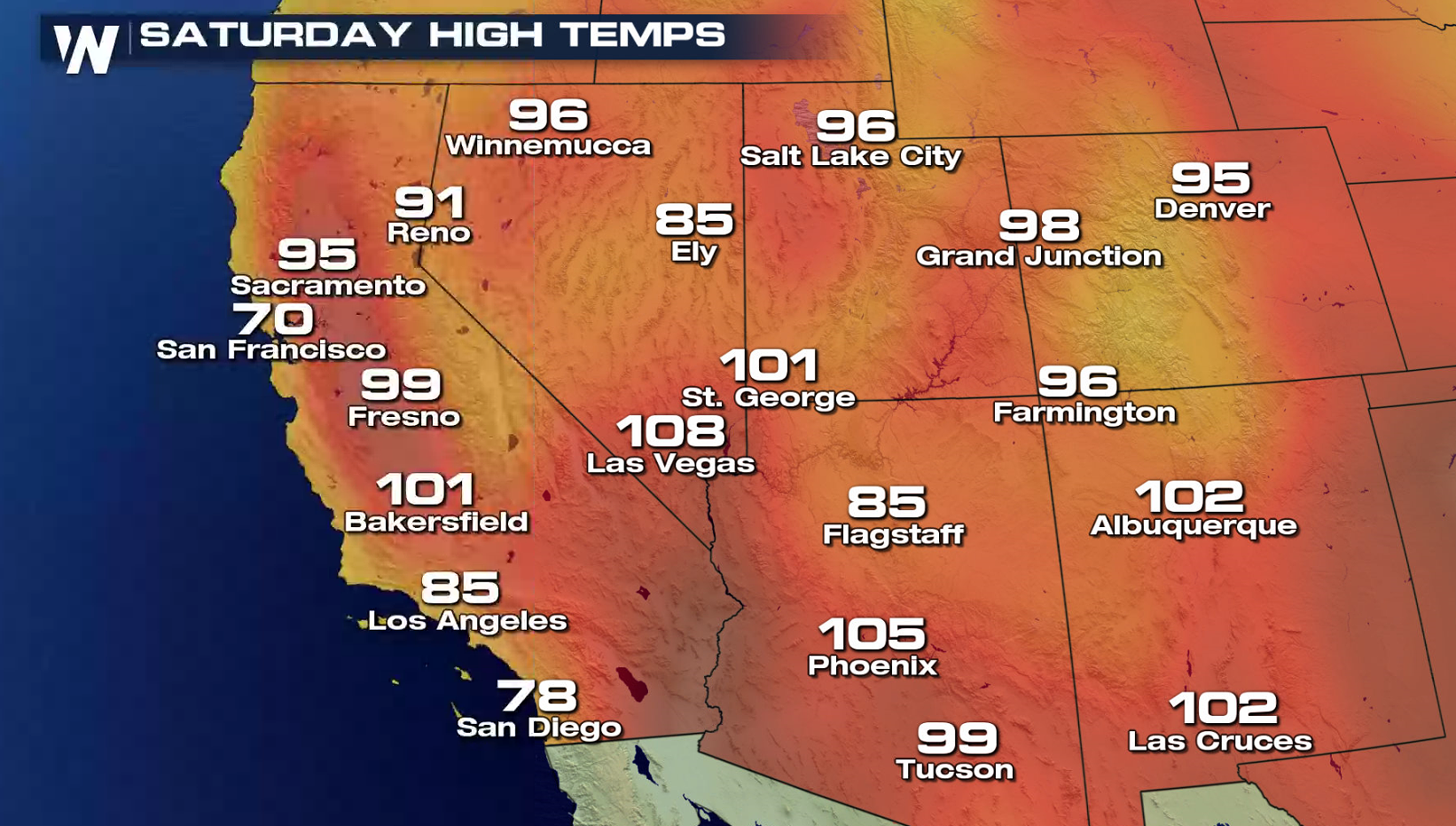 Little relief will be found Sunday. Residents are reminded to drink plenty of fluids, stay in an air-conditioned room, avoid prolonged periods in the sun, and check on relatives and neighbors, especially the elderly. Young children and pets should never be left unattended in vehicles under any circumstances. This is especially true during warm or hot weather when car interiors can reach lethal temperatures in a matter of minutes.
Little relief will be found Sunday. Residents are reminded to drink plenty of fluids, stay in an air-conditioned room, avoid prolonged periods in the sun, and check on relatives and neighbors, especially the elderly. Young children and pets should never be left unattended in vehicles under any circumstances. This is especially true during warm or hot weather when car interiors can reach lethal temperatures in a matter of minutes.
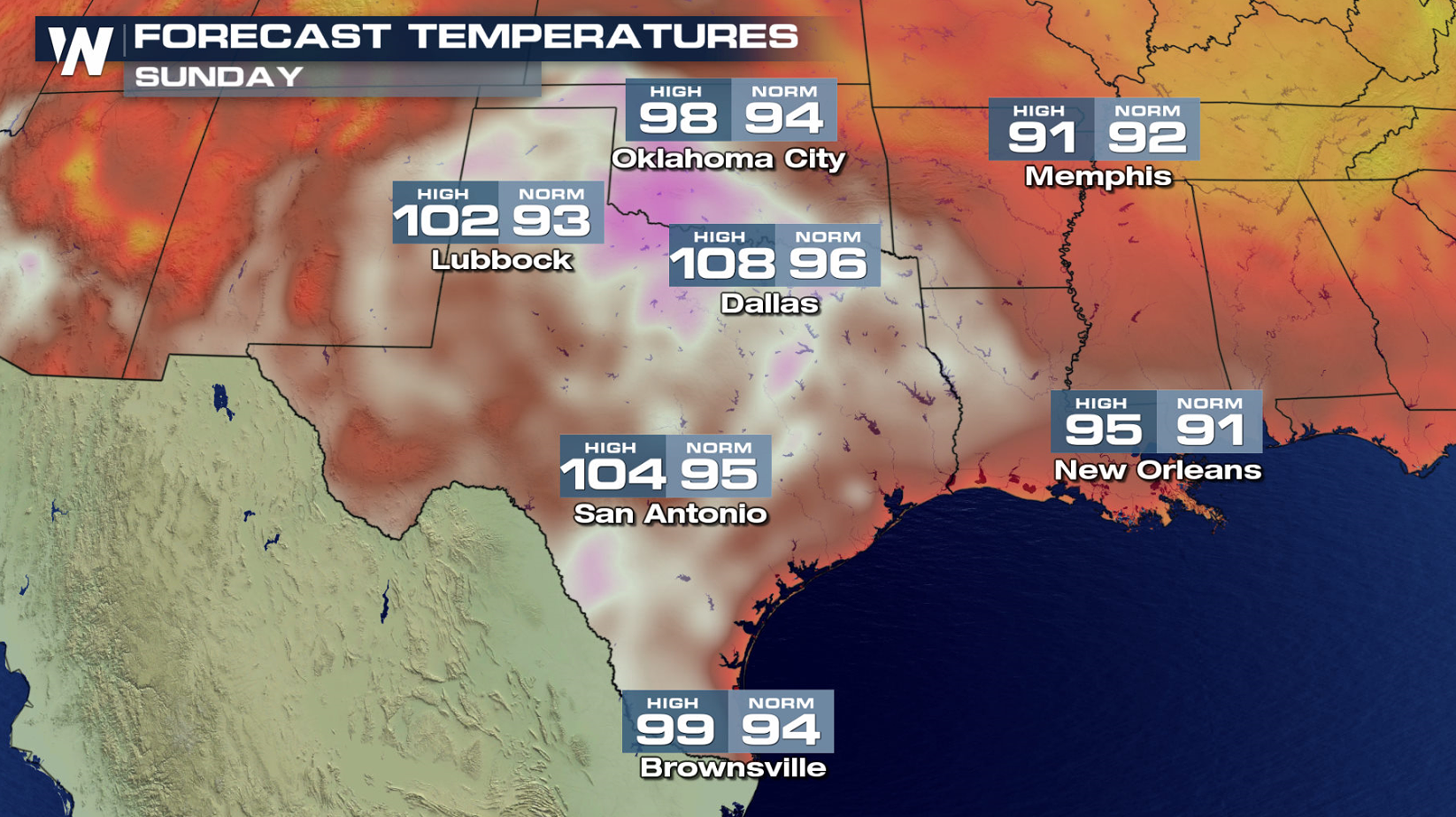
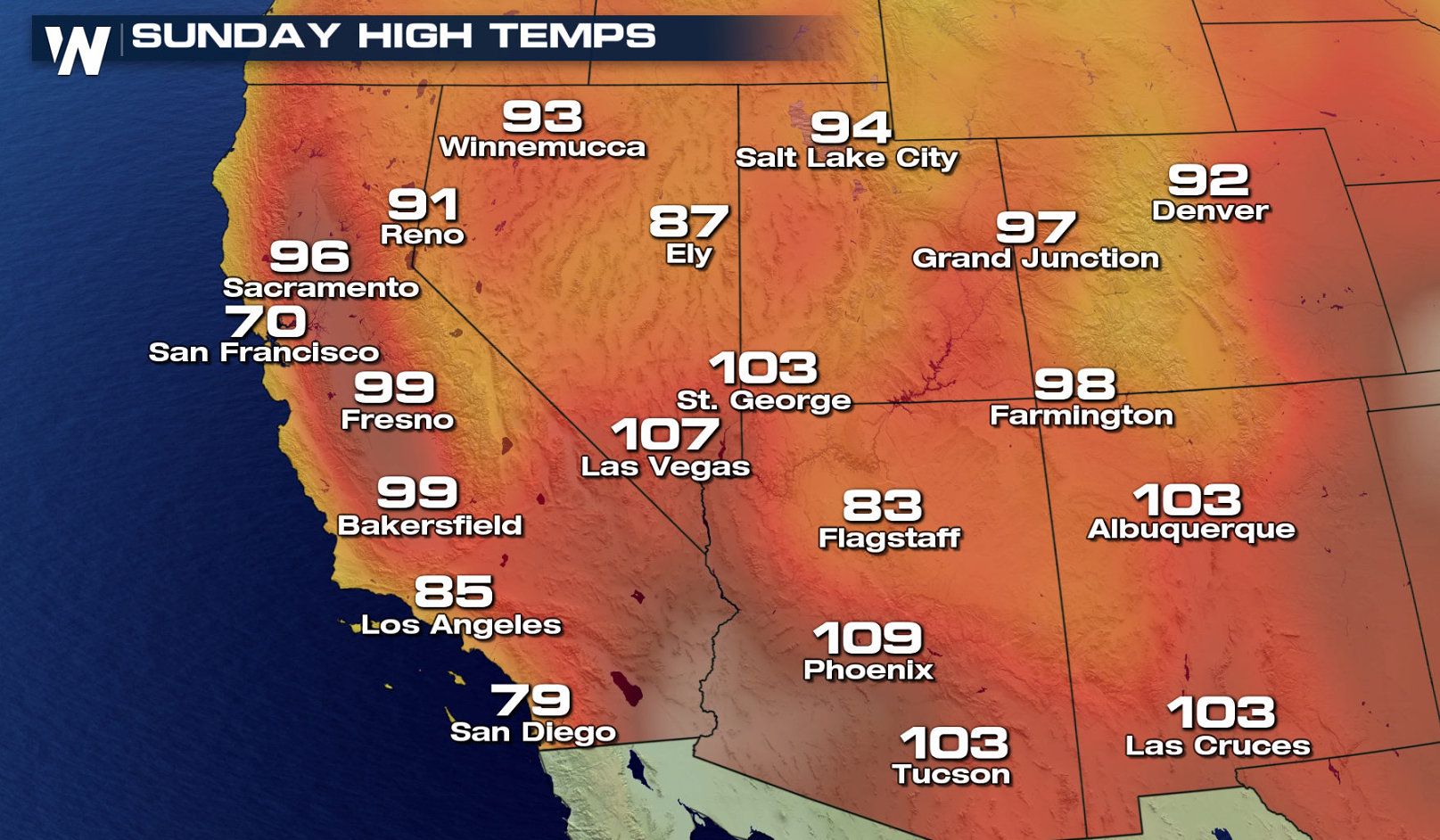 It will still be oppressively hot across the South, although not as extreme. The extreme heat will build westward into the Southwest, as highs jump above 110 in parts of California, Nevada, and Arizona.
It will still be oppressively hot across the South, although not as extreme. The extreme heat will build westward into the Southwest, as highs jump above 110 in parts of California, Nevada, and Arizona.
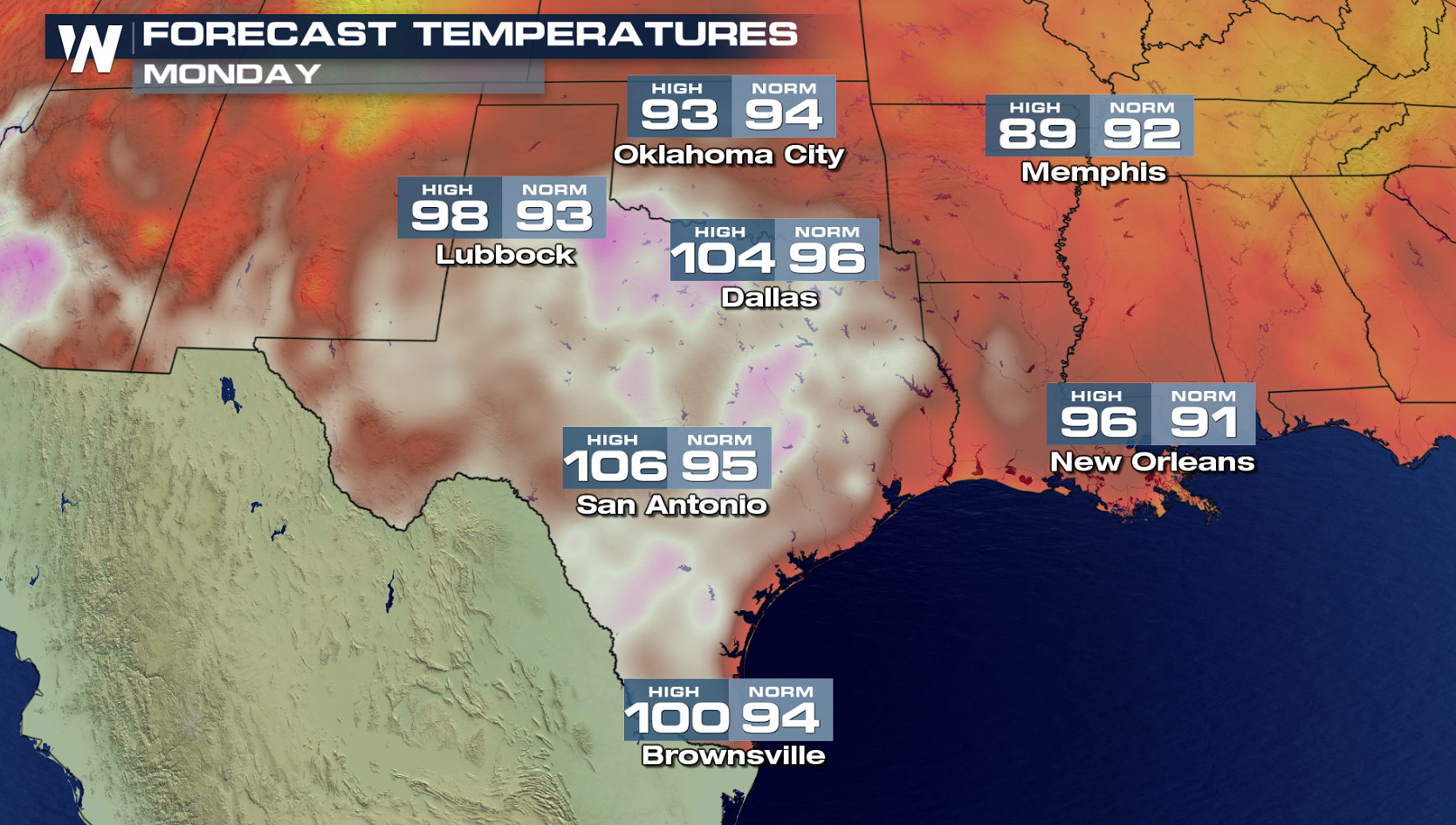
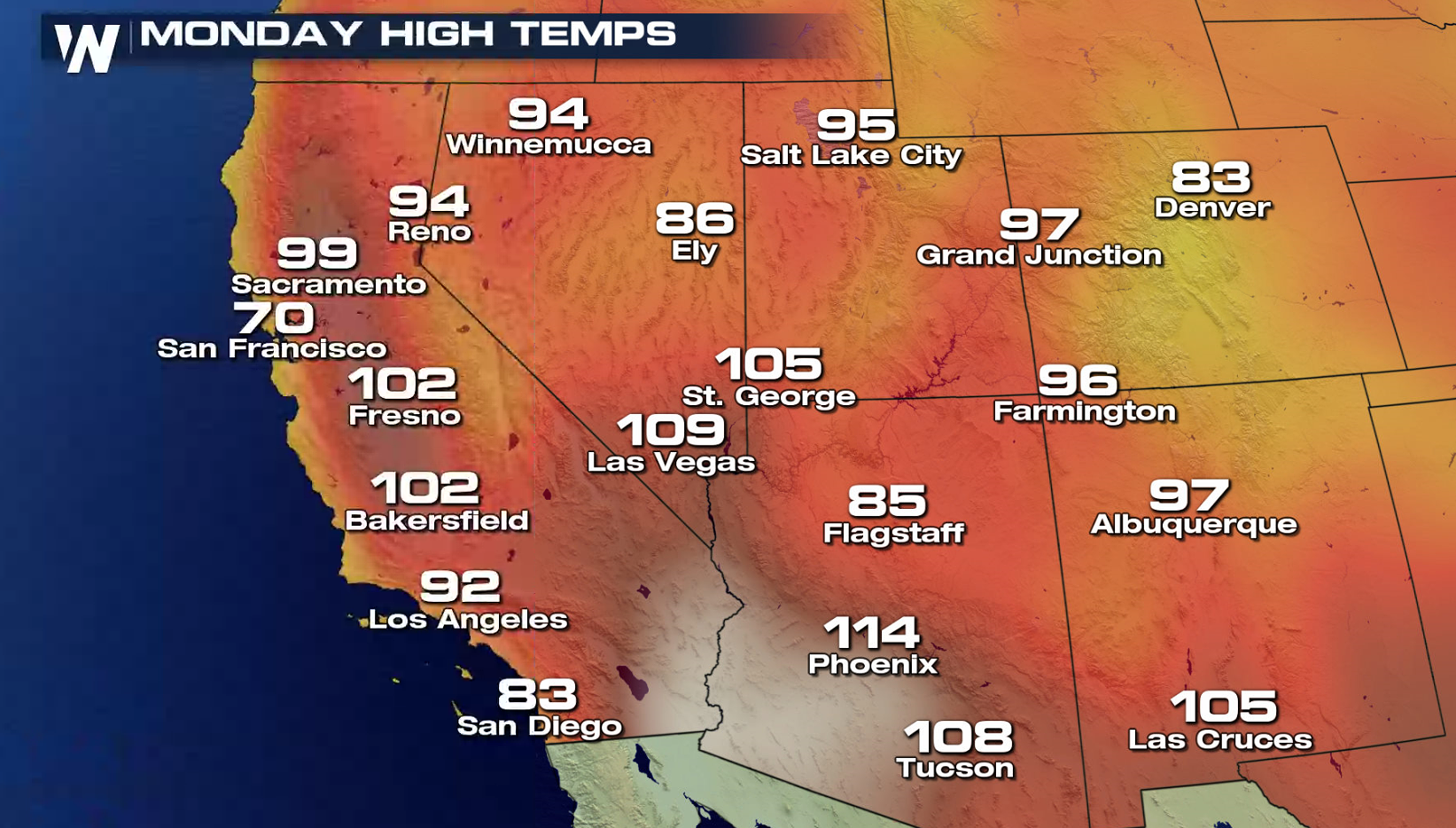
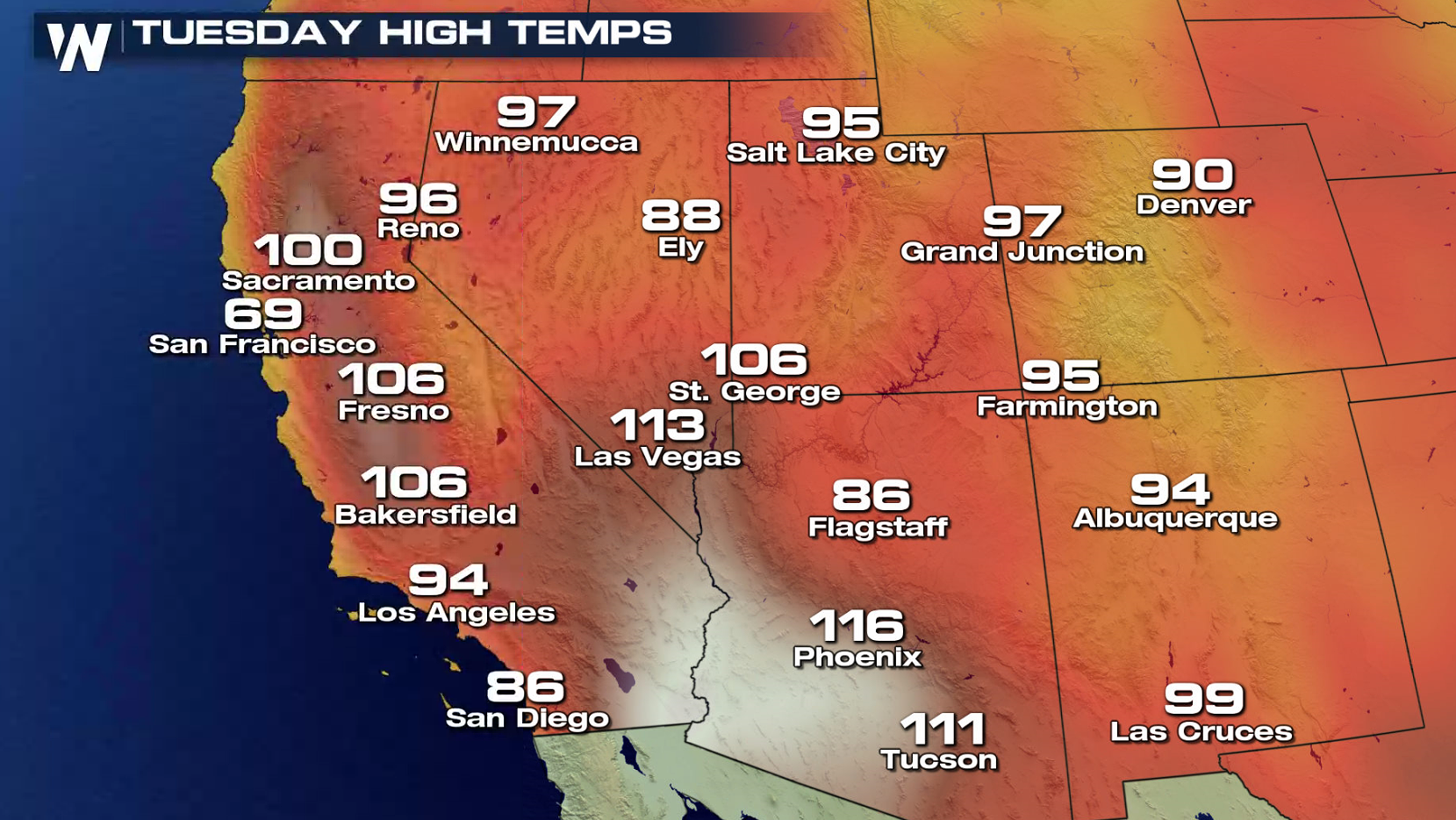 When possible, reschedule strenuous activities to early morning or evening. Know the signs and symptoms of heat exhaustion and heat stroke. Wear light weight and loose fitting clothing when possible and drink plenty of water. Take extra precautions if you work or spend time outside. To reduce risk during outdoor work the occupational safety and health administration recommends scheduling frequent rest breaks in shaded or air conditioned environments. Anyone overcome by heat should be moved to a cool and shaded location.
For WeatherNation: Meteorologist Mace Michaels
When possible, reschedule strenuous activities to early morning or evening. Know the signs and symptoms of heat exhaustion and heat stroke. Wear light weight and loose fitting clothing when possible and drink plenty of water. Take extra precautions if you work or spend time outside. To reduce risk during outdoor work the occupational safety and health administration recommends scheduling frequent rest breaks in shaded or air conditioned environments. Anyone overcome by heat should be moved to a cool and shaded location.
For WeatherNation: Meteorologist Mace Michaels

 Oklahoma City and Dallas will be near 110 degrees today (Friday), with temperatures running 10 to 15 degrees above average. Several cities will likely see record highs today. Residents are reminded to stay cool, stay hydrated, and stay informed.
Heat related illnesses such as heat exhaustion and heat stroke will be possible. People most vulnerable include those who are spending lots of time outdoors, those who do not have air conditioning, young children, the elderly, and those with chronic ailments.
Oklahoma City and Dallas will be near 110 degrees today (Friday), with temperatures running 10 to 15 degrees above average. Several cities will likely see record highs today. Residents are reminded to stay cool, stay hydrated, and stay informed.
Heat related illnesses such as heat exhaustion and heat stroke will be possible. People most vulnerable include those who are spending lots of time outdoors, those who do not have air conditioning, young children, the elderly, and those with chronic ailments.


 Texas will be as hot on Saturday, but it won't be as oppressive north of the Red River of the South. The heat will start to increase further west, as Las Vegas will approach 110.
Recognize the signs and symptoms of heat illness. Early symptoms include things such as headache, thirst, and muscle cramps. Serious symptoms include weakness, skin that is cool to the touch, fast but weak pulse, nausea, and fainting. Severe symptoms include hot and red dry skin, fast and strong pulse, sweating that has stopped, and unconsciousness. Untreated heat illness can lead to fatal heat stroke.
Texas will be as hot on Saturday, but it won't be as oppressive north of the Red River of the South. The heat will start to increase further west, as Las Vegas will approach 110.
Recognize the signs and symptoms of heat illness. Early symptoms include things such as headache, thirst, and muscle cramps. Serious symptoms include weakness, skin that is cool to the touch, fast but weak pulse, nausea, and fainting. Severe symptoms include hot and red dry skin, fast and strong pulse, sweating that has stopped, and unconsciousness. Untreated heat illness can lead to fatal heat stroke.

 Little relief will be found Sunday. Residents are reminded to drink plenty of fluids, stay in an air-conditioned room, avoid prolonged periods in the sun, and check on relatives and neighbors, especially the elderly. Young children and pets should never be left unattended in vehicles under any circumstances. This is especially true during warm or hot weather when car interiors can reach lethal temperatures in a matter of minutes.
Little relief will be found Sunday. Residents are reminded to drink plenty of fluids, stay in an air-conditioned room, avoid prolonged periods in the sun, and check on relatives and neighbors, especially the elderly. Young children and pets should never be left unattended in vehicles under any circumstances. This is especially true during warm or hot weather when car interiors can reach lethal temperatures in a matter of minutes.

 It will still be oppressively hot across the South, although not as extreme. The extreme heat will build westward into the Southwest, as highs jump above 110 in parts of California, Nevada, and Arizona.
It will still be oppressively hot across the South, although not as extreme. The extreme heat will build westward into the Southwest, as highs jump above 110 in parts of California, Nevada, and Arizona.


 When possible, reschedule strenuous activities to early morning or evening. Know the signs and symptoms of heat exhaustion and heat stroke. Wear light weight and loose fitting clothing when possible and drink plenty of water. Take extra precautions if you work or spend time outside. To reduce risk during outdoor work the occupational safety and health administration recommends scheduling frequent rest breaks in shaded or air conditioned environments. Anyone overcome by heat should be moved to a cool and shaded location.
For WeatherNation: Meteorologist Mace Michaels
When possible, reschedule strenuous activities to early morning or evening. Know the signs and symptoms of heat exhaustion and heat stroke. Wear light weight and loose fitting clothing when possible and drink plenty of water. Take extra precautions if you work or spend time outside. To reduce risk during outdoor work the occupational safety and health administration recommends scheduling frequent rest breaks in shaded or air conditioned environments. Anyone overcome by heat should be moved to a cool and shaded location.
For WeatherNation: Meteorologist Mace MichaelsAll Weather News
More